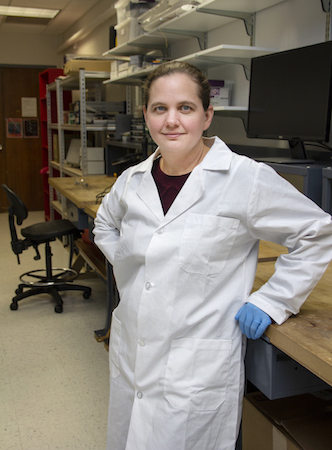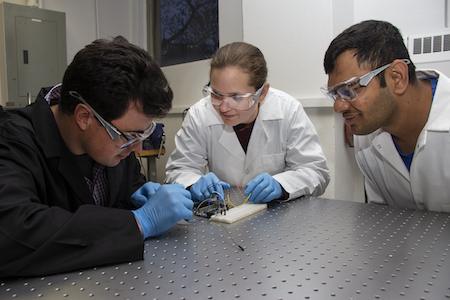Merging microsystems and robotics
Sarah Bergbreiter brings her expertise to the College of Engineering
Nov 29, 2018

Source: Sarah Bergbreiter
Professor Bergbreiter joined the Department of Mechanical Engineering in Fall 2018.
Sarah Bergbreiter has loved robotics since watching Star Wars as a child. That love continued when she learned of small-scale robotics and decided to pursue the discipline in her graduate studies. “It’s an enormous challenge to build a big robot,” she says. “It’s an even bigger challenge to build a tiny robot the size of an ant!”
Joining the Department of Mechanical Engineering in Fall 2018, she directs the Micro Robotics Lab where her team uses microsystems, microfabrication, and novel materials as a tool to improve robotics.
Prior to her arrival at Carnegie Mellon University, she taught at the University of Maryland for the last decade. There, she appreciated the academic culture she, her students, and her colleagues created. She looks forward to investing herself in CMU's history of robotics and microsystems and working alongside the university’s faculty and students.
After all, “the most important resource in any research program are the people,” Bergbreiter says. “I hope that my research group continues to grow, and can create a bridge between robotics and research in microsystems/additive manufacturing.” As one example, she plans to continue her past research developing microfabricated soft sensors to detect mechanical signals such as strain or pressure. Deploying these sensors on robots will allow autonomous systems to more easily adapt to environments and interact with people.
How can we build and take advantage of 100s to 1000s of mechanosensors on robotic systems?
Sarah Bergbreiter, Professor, Mechanical Engineering, Carnegie Mellon University

Source: College of Engineering
In the lab with students.
Bergbreiter received her B.S.E. in electrical engineering from Princeton University in 1999 followed by a short stint at a small startup building sensor networks. She received an M.S. and Ph.D. from the University of California, Berkeley, focusing on micro-robotics. She joined the University of Maryland, College Park in 2008 as an assistant professor of Mechanical Engineering with a joint appointment in the Institute for Systems Research.
She received a DARPA Young Faculty Award in 2008, a National Science Foundation (NSF) CAREER Award in 2011, and a Presidential Early Career Award for Scientists and Engineers Award in 2013 for her research on engineering robotic systems at sub-millimeter scale. She also earned the Best Conference Paper Award at IEEE’s International Conference on Robotics and Automation (ICRA) in 2010 for her work incorporating new materials into micro-robotics.
Bringing her expertise to Carnegie Mellon’s College of Engineering, Bergbreiter and her research team will ask questions ranging from “how should ant-scale robots move?” to “how can we build and take advantage of 100s to 1000s of mechanosensors on robotic systems?” to “how can we better design robots made of many materials with widely varying properties?” We’re looking forward to the answers.
Media contact:
Lisa Kulick
lkulick@andrew.cmu.edu